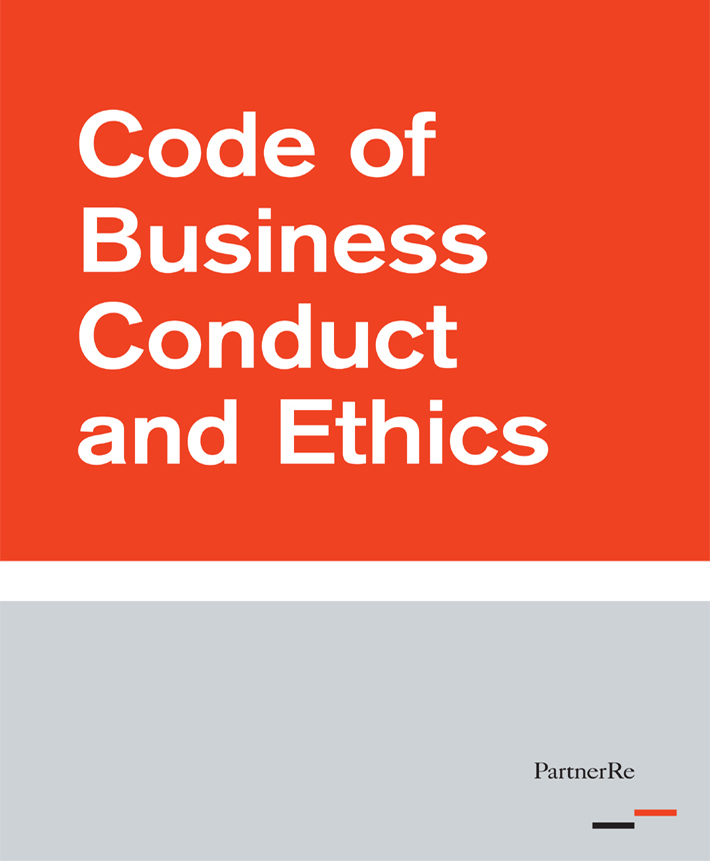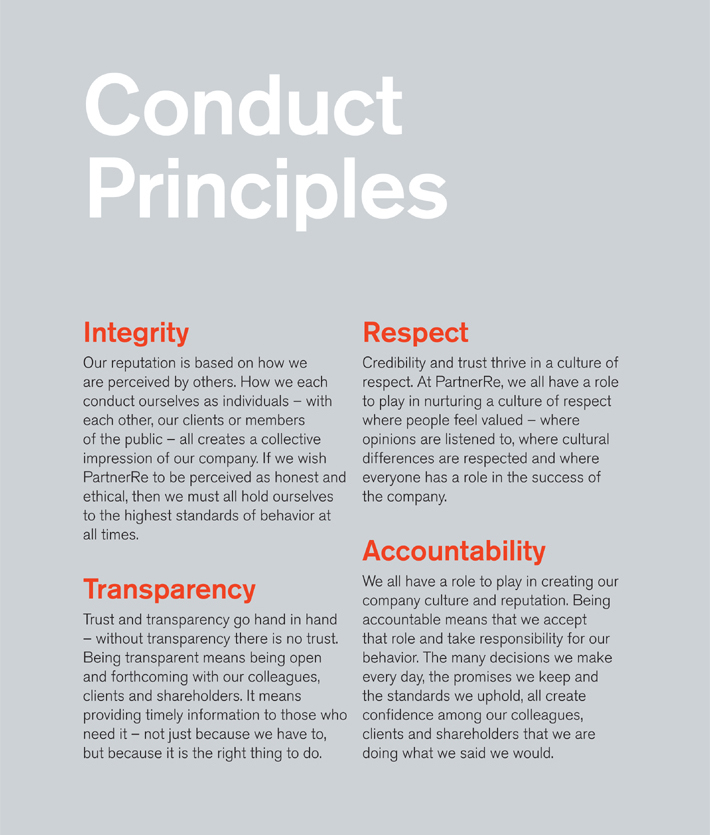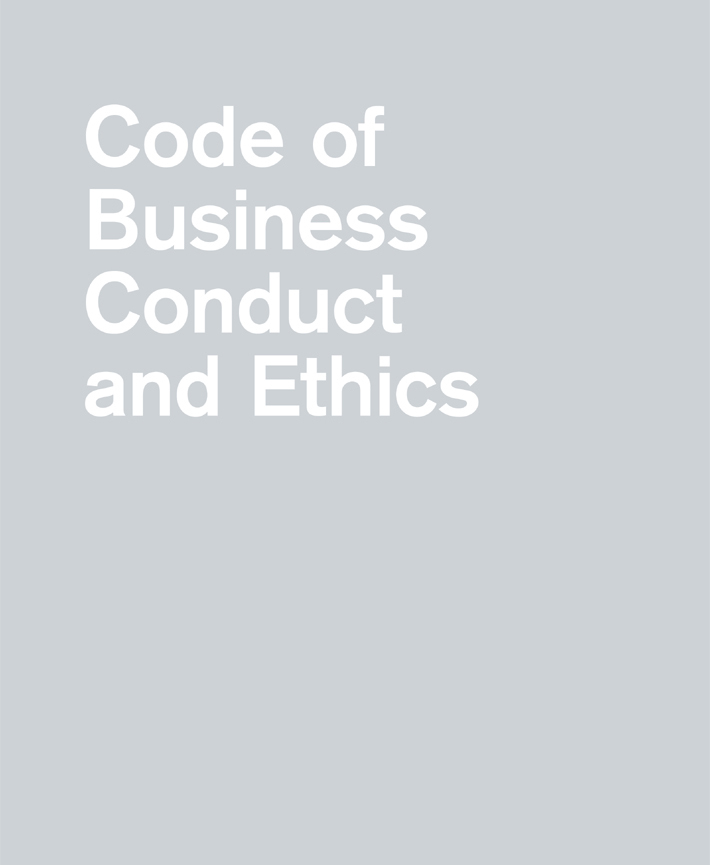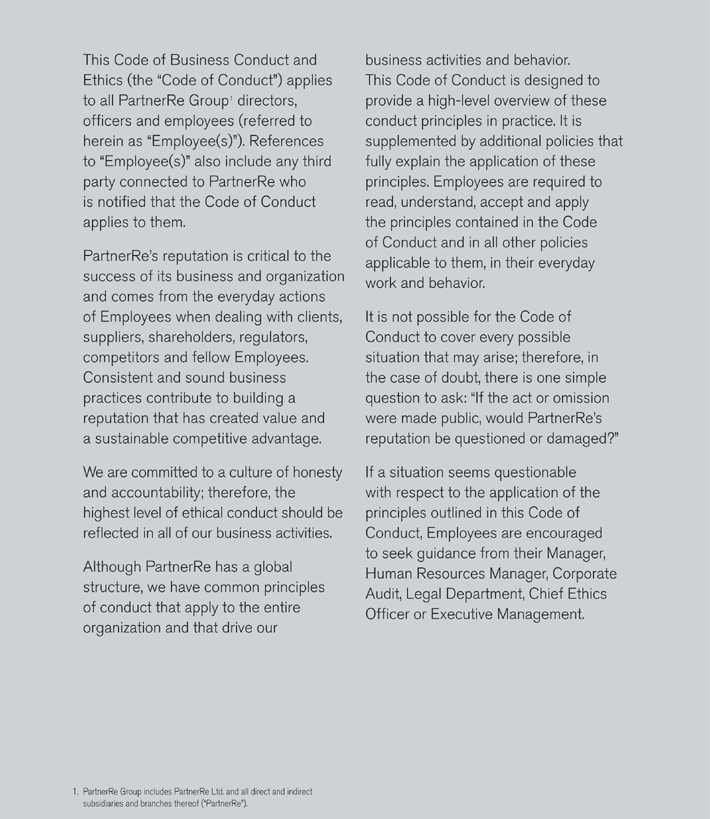Exhibit 14.1


| | |

| | To All PartnerRe Employees: Over the years, our reputation as a transparent, fair and professional organization has been central to our success. These attributes have given us a competitive advantage and helped us to create value for our clients, shareholders and ourselves. |
PartnerRe’s Code of Business Conduct and Ethics is a statement about how we as a company, as business units and as individuals do business. It sets out the conduct principles and sound business practices that should be the starting point for every decision and action we make – because everything we do has the potential to either enhance or detract from PartnerRe’s reputation.
We all have a responsibility to our clients and shareholders, who rely on each one of us to achieve our business goals consistently, intelligently and ethically. This document provides the guidance you need to fulfill that expectation.

Costas Miranthis
President and CEO
PartnerRe Ltd.
PartnerRe
| | | | | | |
| | | Page | |
| | |
| | Conduct Principles | | | 3 | |
| | Integrity | | | | |
| | Transparency | | | | |
| | Respect | | | | |
| | Accountability | | | | |
| | | |
| | |
| | Code of Business Conduct and Ethics | | | 4 | |
| | Governance | | | 6 | |
| | Reporting Violations | | | 6 | |
| | Work Environment | | | 7 | |
| | Conflicts of Interest | | | 7 | |
| | Financial and Non-Financial Integrity | | | 9 | |
| | Legal and Regulatory Integrity | | | 9 | |
| | Anti-Trust and Fair Dealing | | | 10 | |
| | Insider Trading | | | 10 | |
| | Sanctions and Anti-Money Laundering | | | 11 | |
| | Bribery and Corruption | | | 11 | |
| | Fraud | | | 12 | |
| | Protection and Proper Use of PartnerRe Resources | | | 13 | |
| | Corporate Opportunities and Resources | | | 13 | |
| | Electronic Communications | | | 14 | |
| | Confidentiality | | | 14 | |
| | |
| 2 | Code of Business Conduct and Ethics | | December 2011 |

PartnerRe

| | |
| 4 | Code of Business Conduct and Ethics | | December 2011 |

PartnerRe
Governance
This Code of Conduct has been approved by the Board of Directors of PartnerRe Ltd. (the “Board”). Any specific waiver of the provisions of this Code of Conduct or material amendment requires the approval of the Board or a committee of the Board.
Any violation of the Code of Conduct will result in appropriate disciplinary measures, up to and including dismissal. Criminal misconduct may be referred to the appropriate legal authorities.
If a policy in this Code of Conduct conflicts with the law, the law shall prevail. If a local custom or policy conflicts with this Code of Conduct, the Code of Conduct shall prevail. Any questions in connection with conflicts should be addressed to the Legal Department.
| | Q | If I comply with local laws and regulations, will this ensure my compliance with the Code of Conduct? |
| | A | Not necessarily. Our Code of Conduct may impose standards that are more rigorous than those imposed by local laws and regulations. In these situations, and provided that the Code of Conduct does not conflict with laws and regulations, you should make sure that you comply with the Code of Conduct. |
| 2. | The reporting process may differ subject to Employee location. |
Reporting Violations
(Whistleblowing Procedure)
An Employee who becomes aware of any activities that appear to violate the laws, rules, regulations or provisions of this Code of Conduct or any other PartnerRe policy, is expected to promptly report the possible violation. PartnerRe has a process that governs how Employees may openly, confidentially or anonymously report an actual or potential violation without fear of retaliation. This process is described in the Whistleblowing Procedure2.
| | Q | I am concerned that someone may have breached the Code of Conduct, but I am not really sure. What should I do? |
| | A | Even in circumstances where you are unsure but have questions or concerns, we encourage you to report the perceived breach of the Code of Conduct. In order to facilitate the reporting of employee concerns, we have established a Whistleblowing Procedure, which provides certain mechanisms for Employees to submit, on a confidential basis, concerns in good faith. There are no repercussions for any Employee with respect to good faith reporting of complaints or questions. |
| | |
| 6 | Code of Business Conduct and Ethics | | December 2011 |
Work Environment
PartnerRe strives to provide each Employee with a healthy and safe work environment. It is the responsibility of each Employee to maintain this healthy and safe workplace by following environmental, health and safety rules and practices and by reporting accidents, injuries and unsafe equipment, practices or conditions.
We expect our work environment to be free from all forms of discrimination, harassment or intimidation and will therefore not tolerate any prejudice, whether based on race, color, age, religion, gender, sexual orientation, national origin or otherwise.
All Employees are expected to perform their duties in a safe manner, free from the influence of alcohol, illegal drugs or other controlled substances (except for prescription medication for medical treatment). The use of illegal drugs in the workplace will not be tolerated. Although alcohol may be consumed at work-related events when the local custom and occasion make it appropriate to do so, it is the responsibility of each Employee to consume no more than moderate amounts and to ensure that his/her performance, judgment and behavior are unimpaired.
PartnerRe encourages direct and open communication among and between Employees and management. Employees are free to discuss issues with their Managers without fear of reprisal or the need for third-party representation. Any form of retaliation will result in appropriate disciplinary measures.
| 3. | For the purposes of this Code of Conduct, Immediate Family Member includes an Employee’s relatives or partner sharing their household. |
Conflicts of Interest
PartnerRe is committed to an environment free from conflicts of interest. A conflict of interest occurs when the private interests of an Employee or the private interests of his/her Immediate Family Member3 interfere, or appear to interfere, with the interests of PartnerRe. Employees should discuss any circumstance that creates a real or potential conflict of interest with their Manager.
| | Q | Every year one of our suppliers sends me a couple of bottles of wine in the festive season – can I accept them? |
| | A | You have to decide if the gift is reasonable and appropriate in the circumstances. Gifts of a nominal value are acceptable, but you must be sure that such a gift will in no way influence your business judgment or could be perceived as favoring the giver. If you are unsure how to respond to a receipt of a gift, contact the Legal department. |
PartnerRe
Some examples of prohibited behavior that are considered to be conflicts of interest are listed below. Employees may not:
| • | | Accept fees, commissions or any other personal benefit from a person or business involved in any transaction with PartnerRe. |
| • | | Accept gifts, discounts, services, transportation or any other form of services or goods or favors of value from contractors, vendors, brokers, agents, client companies or persons providing services/materials to PartnerRe other than of nominal value. |
| | • | | Offer favors, gifts or services other than those that are reasonable and appropriate for the individuals involved and supported by appropriate documentation and approvals. |
| | • | | Offer or accept cash (or cash equivalent), loans or guarantees in a personal capacity in any amount to/from a supplier, client, potential supplier or potential client. |
| | • | | Arrange or facilitate any business transaction between their Immediate Family Member and any client or supplier. |
| • | | Have a financial interest in clients, suppliers, competitors or any enterprise that is known to have a business relationship with PartnerRe, except where the financial interest is less than 1% of a publicly traded company. |
| • | | Borrow from or lend to clients, suppliers or fellow Employees except for normal banking transactions with financial institutions conducted on a commercial basis. |
Any activity that an Employee is aware of that has similar characteristics to the above, or could be perceived to have similar characteristics, and any material transaction or relationship that could reasonably be expected to give rise to a conflict of interest, requires disclosure to the Legal Department.
| | Q | One of my clients has invited me to stay at his holiday home whenever I want – is this permitted under the Code of Conduct? |
| | A | No. You may not accept any “favors of value” from a supplier, client, potential supplier, client or competitor, other than of nominal value. |
| | |
| 8 | Code of Business Conduct and Ethics | | December 2011 |
Financial and Non-Financial Integrity
All financial transactions must be accurately and fairly recorded in a timely manner in accordance with applicable accounting standards and the policies of PartnerRe. All periodic reports that PartnerRe is required to file with the U.S. Securities and Exchange Commission and PartnerRe’s other public communications shall contain full, fair, accurate, timely and understandable disclosure.
Legal and Regulatory Integrity
(Policies: Anti-Trust, Trading, Sanctions and Anti-Money Laundering, Anti-Bribery, Anti-Fraud)
PartnerRe operates in multiple jurisdictions around the world. PartnerRe and all of its Employees must comply fully with the laws, rules and regulations of the cities, states and countries in which we operate. Although Employees are not expected to know the details of each of these laws, rules and regulations, it is important to know enough to determine when to seek advice from the Legal Department or other appropriate persons.
Employees may under no circumstance knowingly mislead or misrepresent any PartnerRe information specifically but without limitation to auditors, regulators or any other official bodies.
PartnerRe
Anti-Trust and Fair Dealing
(Policies: Anti-Trust, Fair Disclosure, Trading)
PartnerRe is committed to preserving free competition according to all anti-trust and competition laws and regulations applicable to the jurisdictions in which we conduct business.
Employees are required to comply with these laws and regulations and to operate fairly and avoid anti-competitive practices.
Employees must endeavor to deal fairly with PartnerRe’s clients, suppliers, service providers, competitors and other Employees. No Employee should take unlawful advantage of anyone through manipulation, concealment, abuse of privileged information, misrepresentation of material facts or any other unfair dealing practice.
| | Q | Am I permitted to talk to our competitors about pricing trends as long as I don’t talk specifically about PartnerRe pricing or our competitors’ products? |
| | A | General discussions on publicly known industry trends may be permitted. You must however be mindful of how these discussions may be perceived and how this information may be used by others. As a rule, you should always decline to discuss specific pricing and terms with competitors. |
Insider Trading
(Policy: Trading)
All Employees must comply with all applicable securities laws and PartnerRe’s policy on the sale and purchase of PartnerRe securities. All Employees are strictly prohibited from trading any securities, not just PartnerRe securities, while in possession of Material Non-Public Information (as defined in the Trading Policy). Various controls are in place to assist Employees in complying with securities laws.
| | Q | I want to purchase shares of PartnerRe but am not sure if I have material, non-public information. What should I do? |
| | A | If you are unsure if you have Material Non-Public Information, you should contact Group Legal. |
| | |
| 10 | Code of Business Conduct and Ethics | | December 2011 |
Sanctions and Anti-Money Laundering
(Policy: Sanctions and Anti-Money Laundering)
Jurisdictions in which PartnerRe operates often impose legal restrictions against doing business with certain designated countries, people and organizations and have enacted laws to prevent money laundering.
Employees are required to familiarize themselves with the PartnerRe’s Sanctions and Anti-Money Laundering Policy in order to detect and prevent money laundering, terrorism financing or transactions with prohibited countries, people and organizations.
| | Q | Where can I find a list of the designated countries that have restrictions in place that prevent PartnerRe from doing business there? |
| | A | A list of the designated countries can be found on Relink. |
Bribery and Corruption
(Policy: Anti-Bribery)
PartnerRe is committed to fighting corruption, in compliance with applicable laws and regulations, of the country in which business is conducted. Employees must not accept or offer, directly or indirectly, during the course of their duties, any benefit (including money, gifts or services) from or to public officials, politicians, political parties, or any other person or organization with a view to inducing them to do or not do something within the scope of, or facilitated by, their job or position.
PartnerRe
Fraud
(Policies: Anti-Fraud, Data Privacy, Information Security)
There is no tolerance of fraud involving any Employees or third party with a business association with PartnerRe. Many of the actions that are prohibited under this Code of Conduct may constitute fraudulent activity, including, but not limited to:
| • | | Misappropriation of funds, securities, supplies, or other PartnerRe assets. |
| • | | Impropriety in the handling or reporting of money or financial transactions and statements. |
| • | | Profiting as a result of being in possession of Material Non-Public Information relating to PartnerRe activities. |
| • | | Disclosing confidential or proprietary information to outside parties. |
| • | | Disclosing securities activities or acquisitions engaged in or contemplated by PartnerRe. |
| • | | Accepting or seeking anything of material value from contractors, vendors, brokers, agents, client companies or persons providing services/materials to PartnerRe. |
| • | | Destruction, removal or inappropriate use of records and intellectual property (electronic or physical), furniture, fixtures or equipment. |
| • | | Recording of fictitious journal entries or similar adjustments. |
| • | | Intentionally biasing assumptions and judgments used to estimate certain account balances such as loss reserves. |
| • | | Entering into transactions that are outside PartnerRe’s normal or approved course of business and lacking in economic substance. |
| • | | Any similar or related irregularity. |
| | Q | Should I report a suspicion of fraud even if I don’t have any proof? |
| | A | If you report a breach of the Code of Conduct, you should be as specific as possible about the possible violation you have witnessed and provide as much detailed information as you can to help facilitate an investigation. Even if you don’t have evidence, you should still report suspected fraudulent behavior. |
| | |
| 12 | Code of Business Conduct and Ethics | | December 2011 |
Protection and Proper Use of PartnerRe Resources
(Policy: Information Technology, Anti-Bribery)
Employees have a responsibility to safeguard and make proper and efficient use of PartnerRe’s assets (both tangible and intangible) and systems (“PartnerRe Resources”).
Each Employee has an obligation to prevent PartnerRe Resources from being lost, damaged, misused, stolen, embezzled or destroyed.
PartnerRe Resources are intended to be used for legitimate business purposes. Limited personal use of PartnerRe Resources is permissible when such use does not lead to inappropriate expense, interfere with business operations or violate the Code of Conduct or any other PartnerRe policy.
Corporate Opportunities and Resources
Employees have a duty to promote PartnerRe’s legitimate interests when the opportunity to do so arises and to use PartnerRe Resources exclusively for that purpose. Corporate opportunities and resources must not be taken or used for personal gain.
Employees shall not take personal advantage of PartnerRe’s property, information or their position and shall not compete directly or indirectly with PartnerRe.
| | Q | One of my relatives is looking for a new insurer and has asked me to set up a meeting with one of our cedants. Is this acceptable under the Code of Conduct? |
| | A | No. You may not arrange or facilitate any business transaction between any Immediate Family Members and any client or supplier. |
PartnerRe
Electronic Communications
(Policy: Electronic Communications)
PartnerRe provides information systems and computer networks to employees. All information conveyed by any type of Electronic Communications (as defined in the Electronic Communications Policy) must be conducted in an appropriate manner and, consequently, must be clear, concise and unambiguous and at all times respectful of other individuals.
Confidentiality
(Policies: External Communications, Information Technology, Information Security, Data Privacy, Fair Disclosure)
Employees must maintain the confidentiality of all information entrusted to them.
Any disclosure of confidential information must be either authorized internally or required by applicable law, regulation or legal process.
Confidential information includes any type of non-public business or personal information with respect to PartnerRe, its Employees, clients, prospective clients, suppliers, shareholders and any other persons or entities with whom PartnerRe has a relationship and that have an expectation of confidentiality.
The obligation to preserve confidential information continues even after Employees leave PartnerRe.
| | Q | I meet after work with a number of friends who work for competitor organizations. How do I decide what is and isn’t confidential information? |
| | A | You must use your own judgment, but be aware that confidential information is any non-public information that, if it became public, might be beneficial to competitors or harmful to PartnerRe or its clients. If in doubt, be cautious, and don’t discuss specific business issues. |
| | |
| 14 | Code of Business Conduct and Ethics | | December 2011 |
This Code of Conduct is supplemented by various policies, many of which are referenced herein. Employees are required to read, understand, accept and apply the principles contained in the Code of Conduct and in all other policies applicable to them in their everyday work and behavior.

www.partnerre.com







